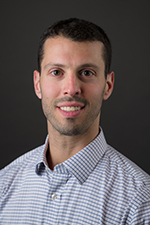Equipped For a Brighter Future
Jason Summer talks about how his Northwestern education gave him the skills he needed to pivot from traditional data analytics to advanced machine learning and artificial intelligence.
Jason Summer (MSiA ‘22) saw a new world in data science dawning in 2021, but he didn't feel he was prepared to seize the opportunities this new world could present.
He then found Northwestern Engineering's Master of Science in Analytics program (now known as the Master of Science in Machine Learning and Data Science (MLDS) program). That discovery ultimately changed the trajectory of his career.
 “Prior to the program, I had worked at organizations that viewed data science and machine learning as nice-to-haves or areas of future interest,” Summer said. “My goal was to join an organization that viewed data science and machine learning as more critical areas and revenue drivers.”
“Prior to the program, I had worked at organizations that viewed data science and machine learning as nice-to-haves or areas of future interest,” Summer said. “My goal was to join an organization that viewed data science and machine learning as more critical areas and revenue drivers.”
That is exactly what he did. Today, Summer is a solutions architect in artificial intelligence (AI) and machine learning (ML) at Snowflake, the Data Cloud company.
The journey from then to now started with his goal of embracing the future and accelerated once he found a master’s program that could equip him with the skills he needed. His search for programs centered on those offered by prestigious institutions with full-time, in-person classes that focused on application over theory.
“The program checked all of the boxes,” he said.
But it became his top choice for other reasons.
First, the application process was thorough and thoughtful, which Summer said showed that the program was focused on careful cultivation of a small, tight-knit cohort. It also had a strong core-class curriculum that painted a vibrant picture of what graduates could achieve.
So in September 2021, Summer jumped in.
He said the experience proved to be incredibly rewarding as learning opportunities presented themselves from all angles.
“The faculty consists of the best and brightest in their respective field, and many of them provide masterclasses in instruction,” he said. “However, a massive portion of your education is directly from your peers in the cohort.”
Summer’s experience was further bolstered through the program’s internship requirement. He served as a data science intern with Nike during the summer of 2022.
“That became a critical part of my interviews for full-time positions around graduation,” he said. “The experience was quite humbling and challenging but ultimately very successful on a personal level.”
Now, Summer finds himself exactly where he envisioned being when he decided to pursue his master’s degree.
He is part of an AI/ML-focused team at Snowflake that builds ML models for existing and prospective customers. His day-to-day is a mix of what he calls heads-down engineering work and important client interactions that help bust some of the barriers preventing AI and ML adoption.
“My role ultimately revolves around architecting machine learning models to scale optimally in Snowflake,” he said. “Without the engineering know-how I gained in MSiA, I wouldn't be nearly as comfortable with this line of work.”
Yet comfortable he is, despite being in a fast-paced and ever-evolving industry. Summer said the program helped him learn to embrace uncertainty and be bold in helping write the playbook for navigating new emerging technologies.
“Ambiguity was often injected into projects and assignments,” he said. “It routinely highlighted the need for an engineering skill set in combating the ‘unknown unknowns’ that will always occur in real-world ML projects.”
Because of how the program helped him advance quickly along a new career path, he recommends it to those looking for similar professional growth.
The benefits of a strong and small cohort, coupled with the knowledge of the faculty makes for an ideal learning environment, Summer said.
“The careful curation mentioned earlier extends well beyond the application process,” he said. “Throughout the program, the staff solicit and integrate constant feedback and present themselves as readily available resources to members of the cohort.”

